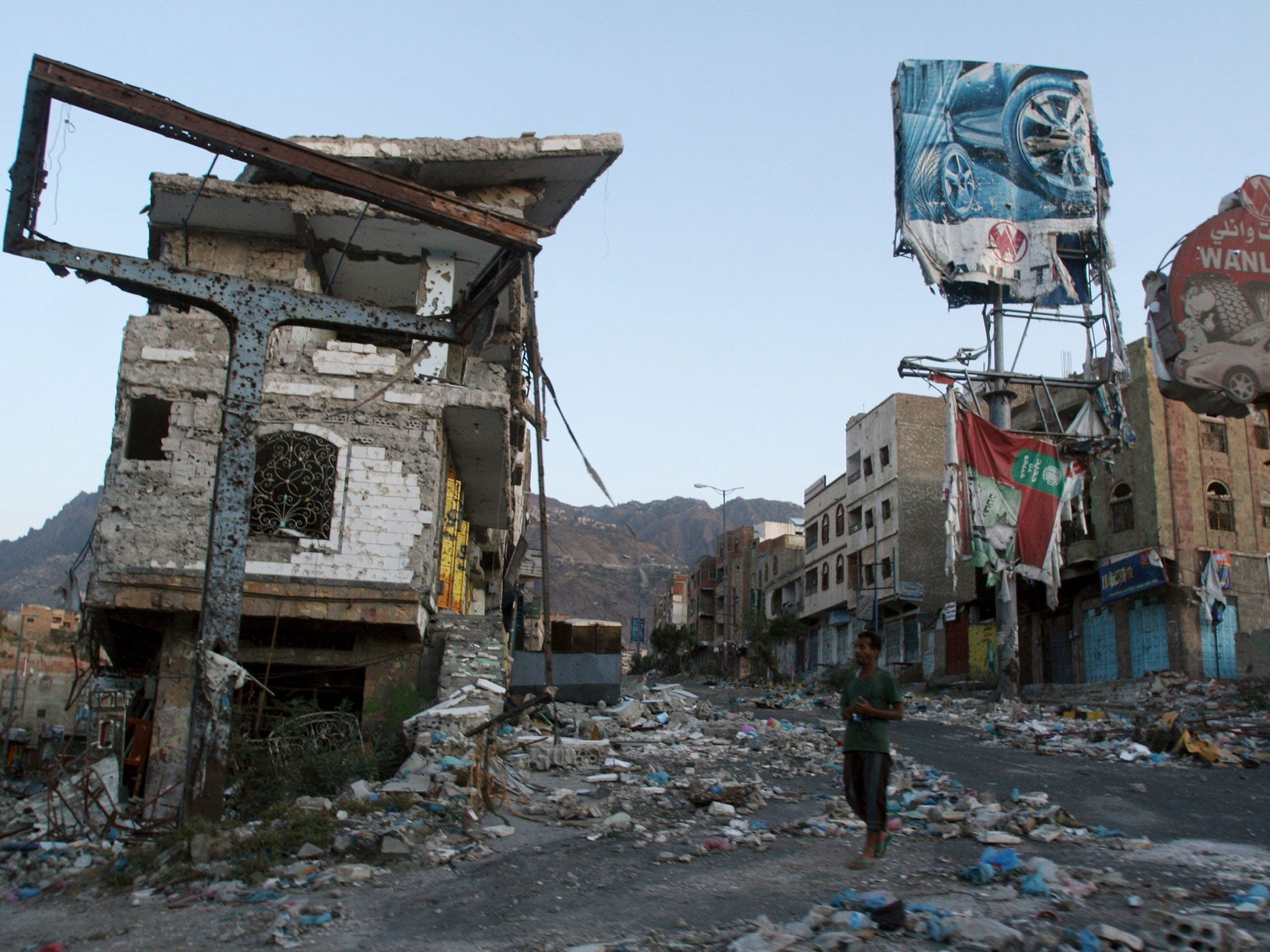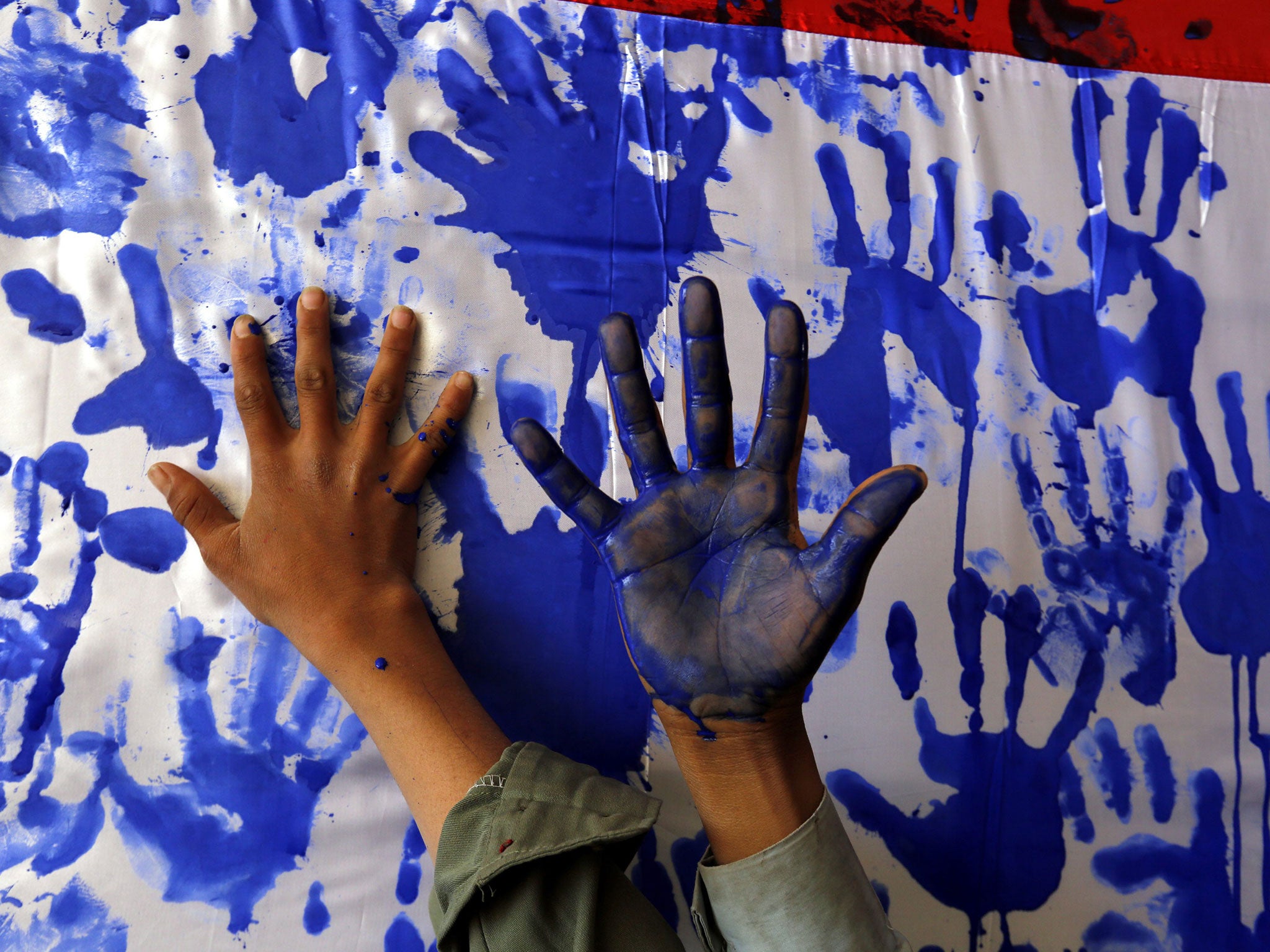Yemen war: Saudi Arabia's savage air strikes end, but the crisis remains
As the Kingdom says it is withdrawing from the war, Alistair Dawber reports on the tragic legacy for the Middle East’s poorest nation

The explosions were so intense it was impossible to identify some of the dead. Seven of the bodies were clearly those of children, caught up by another brutal day in the Middle East’s forgotten war.
The dead and the injured were shown in graphic detail on Yemen’s Al-Masirah television, operated by the Shia Houthi rebels whose advance from their mountain strongholds a year ago next week triggered the onset of the brutal bombing of the region’s poorest nation.
Today, as Saudi Arabia begins a claimed scaling back of its attacks in Yemen, the Houthis still hold much of the west of the country, where they have been fighting forces loyal to Yemen’s recognised, Saudi-backed, government.
The coalition strikes on a market in the northern town of Mustaba this week killed at least 119 people, most of them civilians. More than 100 were injured when two missiles hit the centre of the market, made up of a number of traders selling a variety of goods. A third bomb hit the gates at the entrance, killing more people as they attempted to escape.
“It was the peak of the day when missiles hit, most people get their stuff from there and it was a khat time,” Mustaba resident Mohammed Hamel, 42, who lost his brother in the strikes, told The Independent. “I was approaching the market on foot. My elder brother was buying khat there.”
Mr Hamel last saw his brother buying the mild stimulant plant that many Yemenis chew. “Two missiles hit the market, dozens of bodies were scattered and charred everywhere on the ground,” he said. “We could hardly identify the body of my brother; eventually we found it in the evening, 20 metres away.”
The Saudi coalition of Sunni Muslim countries in the Middle East and north Africa began bombing targets in March last year after the Shia Houthis took ground from the government and forced it to flee the capital.

The missile strikes in Mustaba were the second time in the space of a fortnight that the Saudis and their partners have been accused of bombing a civilian market.
A spokesman for the coalition responded to the Al-Masirah footage by pointing out that there was nothing to prove that the pictures were from the aftermath of a coalition attack. What is proven is the catastrophe that has befallen Yemen.
Since the Saudis began their campaign to oust the Houthis, who have had support from Riyadh’s arch regional enemy, Iran, more than 3,000 civilians have been killed. Among that number is at least 700 children. As well as the violence, the coalition has imposed a blockade on Yemen, preventing much needed humanitarian relief getting in.
Yemenis face starvation and an acute lack of medical supplies, food and water. The UN estimates that half of the country’s 26.5 million people are at risk of famine.
Yet, despite Sanaa still being in the hands of the Houthis, the Saudis suggested that an end to the war is in sight. A spokesman for the coalition, Brigadier General Ahmed al-Asiri, said that combat operations were coming to an end and that the focus was now “long-term” plans to bring stability to Yemen. “The aim of the coalition is to create a strong cohesive government with a strong national army and security forces that can combat terrorism and impose law and order across the country,” he said.
“It is a public relations stunt that is more or less in reaction to the mounting public criticism of the war,” said Hisham al-Omeisy, a Yemen-based political analyst. “And a weak one at that too. The suggestion that major military operations are near to an end was vague, while the fact that the coalition will continue to back the Yemeni government until peace and security is restored was stressed.”
While the Houthis have been accused of shelling civilian areas, there is overwhelming evidence of the Saudis dropping outlawed US-made cluster bombs. As well as the US, the UK is also tacitly supporting the Saudi operation. The UK has now sold more than £6.7bn worth of weapons to the Saudi government since 2010. Earlier this week the Dutch parliament voted to ban arms exports to Saudi Arabia in protest against Riyadh’s record in Yemen.
But where the weapons come from is of little concern to those caught up in the war, which has brought acute suffering and poverty. Ali Mohammed and his wife, Safa, were displaced by the bombing of Taiz, besieged by the Houthis for almost a year. They fled to the Wadi al-Quba camp for displaced people on the outskirts of the city.
“During the first month of displacement, we managed to buy firewood from a trader in the market but later he raised the price as more people came to the camp,” said Mr Mohammed. “We stopped buying firewood since we have little money and lost our jobs because of the conflict. It’s difficult for us to get bread and water.”
His wife, Safa, cooks on a small piece of iron, over a fire of plastic bottles and small pieces of clothes. She says she always has a cough after cooking. “I have gone several times to a hospital and they always tell me that I have a chronic disease and must stay away from the fumes but it’s out of my hands, I have to cook for my family,” she said.
Their story is an example of the difficulties facing millions. While international aid groups, including Oxfam, have been helping them, severe shortages have made the job almost impossible. “About 70 per cent of food comes in from outside, while shortages have led to surges in prices – the price of cooking gas alone is up 100 per cent – and even when you can get supplies there are still the negotiations with various people to get permission to move them around,” Oxfam’s director in Yemen, Sajjad Mohammad Sajid told The Independent. “The situation is bad – there is a complete lack of supplies.”
Others agree and fear that the international community is not doing enough to help. “It’s a catastrophic situation in every sense of the word. The humanitarian crisis is at incomprehensible levels,” says Mr Omeisy. “If there is no serious push for peace talks towards a political solution soon, the future for Yemen is grim.”
Join our commenting forum
Join thought-provoking conversations, follow other Independent readers and see their replies
0Comments